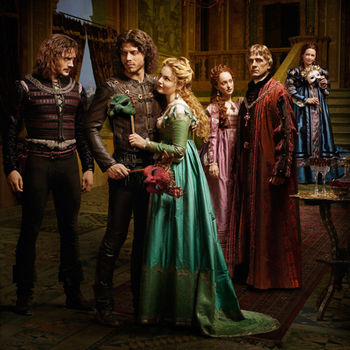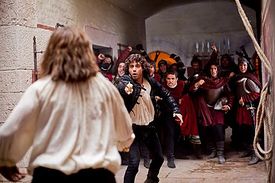The League people
No edit summary |
No edit summary |
||
| Line 3: | Line 3: | ||
While the character of each city can be clearly seen, it is important to appreciate that this is one nation, bound by their egregore and countless generations of migrations and marriages. The people of the League are one nation,"one people with four souls", is how the League often describes itself - and individuals and groups draw their strength and their character from the best qualities of the whole nation. Leaguers are always proud of their city and some strive to exemplify its attributes, but it is as if the qualities were in the cities themselves, more than the people who inhabit them. | While the character of each city can be clearly seen, it is important to appreciate that this is one nation, bound by their egregore and countless generations of migrations and marriages. The people of the League are one nation,"one people with four souls", is how the League often describes itself - and individuals and groups draw their strength and their character from the best qualities of the whole nation. Leaguers are always proud of their city and some strive to exemplify its attributes, but it is as if the qualities were in the cities themselves, more than the people who inhabit them. | ||
True power in the cities is in the hands of the guilds. These organisations, ostensibly exist to allow their members to work together to enrich themselves. In practice many are families and those that aren't often have ties that are every bit as strong. Loyalty to your guild is one of the three great pillars of life in the League. The guilds are exceptionally varied, some are organized to supply a single product or skill and others have no common basis beyond a group of people who join together to make money. There are guilds that are mercenary companies or theatre groups, you could say the churches of the League are little more than guilds. The guilds have no formal powers so they use their stranglehold on economic existence in the cities to rule despite that; if you want to get ahead in the League - you join a guild. | |||
League society greatly prizes loyalty, but scorns servility. Everyone is expected to give as good as they receive. More than anything, the League is committed to the Empire; they don’t speak of it much, but the opportunities and the civilization that the Empire brings is something that many are prepared to die – or preferably kill – to preserve. Imperial rule has brought peace and prosperity but because the citizens of the League see themselves as the pre-eminent people of the Empire, they tend to view the Empire very possessively - as if the whole thing were arranged for their benefit. | League society greatly prizes loyalty, but scorns servility. Everyone is expected to give as good as they receive. More than anything, the League is committed to the Empire; they don’t speak of it much, but the opportunities and the civilization that the Empire brings is something that many are prepared to die – or preferably kill – to preserve. Imperial rule has brought peace and prosperity but because the citizens of the League see themselves as the pre-eminent people of the Empire, they tend to view the Empire very possessively - as if the whole thing were arranged for their benefit. | ||
Revision as of 01:02, 10 August 2012
The four great cities of the League give the nation its spirit. Her love of culture, the appreciation for fine things, opera, theatre, art and dance come from Sarvos. The determination to be the best, savouring every triumph, ferocious competition and ruthless nerve are born of Temeschwar. The problem-solving, imagination and sheer brilliance of Holberg, has lead to their mastery of surgery and engineering. The childlike delight with the cunning and the clever spreads from Tassato, where words are laced with more ambiguity than meaning and every ruse conceals another strategem beneath it.
While the character of each city can be clearly seen, it is important to appreciate that this is one nation, bound by their egregore and countless generations of migrations and marriages. The people of the League are one nation,"one people with four souls", is how the League often describes itself - and individuals and groups draw their strength and their character from the best qualities of the whole nation. Leaguers are always proud of their city and some strive to exemplify its attributes, but it is as if the qualities were in the cities themselves, more than the people who inhabit them.
True power in the cities is in the hands of the guilds. These organisations, ostensibly exist to allow their members to work together to enrich themselves. In practice many are families and those that aren't often have ties that are every bit as strong. Loyalty to your guild is one of the three great pillars of life in the League. The guilds are exceptionally varied, some are organized to supply a single product or skill and others have no common basis beyond a group of people who join together to make money. There are guilds that are mercenary companies or theatre groups, you could say the churches of the League are little more than guilds. The guilds have no formal powers so they use their stranglehold on economic existence in the cities to rule despite that; if you want to get ahead in the League - you join a guild.
League society greatly prizes loyalty, but scorns servility. Everyone is expected to give as good as they receive. More than anything, the League is committed to the Empire; they don’t speak of it much, but the opportunities and the civilization that the Empire brings is something that many are prepared to die – or preferably kill – to preserve. Imperial rule has brought peace and prosperity but because the citizens of the League see themselves as the pre-eminent people of the Empire, they tend to view the Empire very possessively - as if the whole thing were arranged for their benefit.
There is a playful quality to life in the League. They are relentlessly competitive in everything they turn their hands to, always seeking to outdo each other. They are not obsessed with money, as some claim, but money is a great way to judge success - a metric by which to quantify how well you have done. Outsiders who point out that they seem to view life as a game they are playing find their hosts agreeable - "someone is keeping score" is the usual response. But it is not a case of treating war, politics and trade like a child's game, it is a case of treating every game they play as seriously as if it were a war.
There is a ruthless emphasis on the rules in the League. Crime is always a problem in the cities, but those who hold the reins of power regard it as a parasite, eating into their own profits. They enforce the laws with a brutal practicality and pragmatism, that stems in part from a belief that those who break the rules have cheated in the game. It is not just the laws they hold in iron regard, a civil tongue, the customs of the city, her superstitions and her rules are not to be broken. If an individual does not respect League society enough to play by the same rules as everyone else, how can you be sure what other rules they will break? Such people are not trusted and in the League, a lack of trust is fatal to your chances of success.
Almost everything is for sale in the cities; and everything is always on show. Famed for a devotion to the arts, the League claims to have invented opera and theatre and take constant joy in the novel and the clever. They appreciate flair and wit. Those who wait on the table of a Merchant Princess are as likely prized for their subtle humour as their knowledge of etiquette. Witty banter and verbal quips are considered a quintessential trait of League citizens; even the poorest of the League feel free to remark upon the fashions and actions of those around them. Those particularly skilled in verbal interplay can find lucrative employment as professional party guests and agents, given the freedom to say things that might otherwise cause a scene - or a duel.
This is not a nation of effete libertines. Innovative gewgaws and beautiful artworks are prized, but they are nothing compared to the pride these people take in the exercise of their will, their ambition and their success. A clever quip is no substitute for wealth, power, influence and the will to employ them to meet ones goals. The Merchant Prince may continue to make ironic comments when a situation turns deadly serious, but never make the mistake of thinking that he is not prepared to do what it takes to ensure the outcome he favours. More than one guest has made an inappropriate "joke" and discovered themselves ejected from someone's home - often through a first story window.
Any gutter urchin might be a merchant prince one day, so you must be careful, cousin. Kick a puppy today, and tomorrow it might have grown up to be the great big dog that has your hand in its jaws ...
Two Gentlemen of Tassato, Act I, scene iiNames in the League
Each of the four cities of the League has a different flavour. We suggest Italian names for Sarvossian characters, Eastern European names for Temeschwari characters, German or Dutch names for Holberg and Portugese names for Tassato.
Most people in the League use their city as part of their name. They may use one of a number of connecting words - "di", "de", "van" and "of" are all popular and are used interchangably across the League - but they firmly indicate the city they are loyal to. This is usually the city of their birth, but not always. Many League citizens have cause to move from one city to another at one time and some find themselves more at home in their new city than the place of their birth.
Many individuals do not bother with a family name, although they may take some element of their name from their guild.
Sample names
- Elsbet van Temeshwar, of the Black Raven
- Bertolli Giacomi di Sarvos, of the Giacomi Carta

